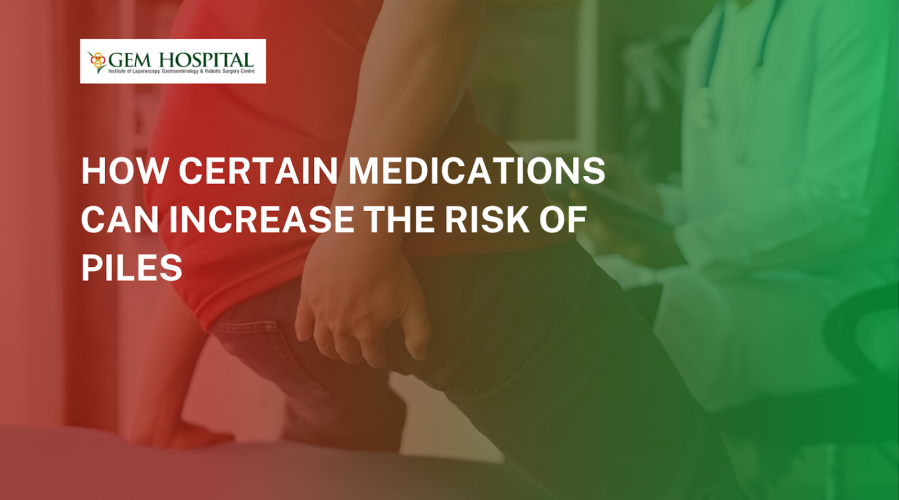Consult experienced hernia doctors in Chennai for expert surgical care. Advanced diagnosis, safe hernia surgery, and faster recovery with specialized treatment.
How Certain Medications Can Increase the Risk of Piles

Piles, or hemorrhoids, are swollen blood vessels found in the rectum or anus that can cause pain, itching, discomfort, and sometimes bleeding. They are a common health problem impacting millions worldwide. While lifestyle factors such as inactivity, poor diet, and prolonged sitting may contribute to the development of piles, some medications may compound the risk. Pharmacologic treatment, if used long-term, can alter normal physiology of the body, such as gastrointestinal function, potentially causing piles or worsening an existing condition. It may be helpful to understand the effect of specific medication classes on your body, and associated side effects, to potentially take piles preventative measures and seek appropriate treatment in a timely manner.
1. Pain medications and anti-inflammatory medications
Pain medications including non-steroidal anti-inflammatory medications or NSAIDs i.e., ibuprofen, naproxen, and aspirin are frequently used for pain and inflammation control, and they are indeed effective for pain management, but sometimes promote the formation of piles in individuals. One of the side effects of prolonged use of NSAIDs are gastrointestinal side effects, particularly constipation. Constipation leads to straining, which raises the pressure in the rectal veins and may contribute to swelling of the blood vessels in the rectum (hemorrhoids). Individuals that rely on NSAID use due to a chronic condition should pay special attention to constipation, and follow diet and lifestyle measures to decrease their chances of further risk. Overusing pain medications can also result in the body's natural ability to perform GI function to decrease, leading to worsening constipation and the possibility of developing piles. If you take NSAIDs regularly, be sure to drink enough fluids and maintain a high fiber diet, and discuss alternative pain management options with a healthcare professional.
2.Diuretics (Water Pills)
Diuretics are medications prescribed for conditions such as hypertension (high blood pressure) and heart disease to assist the body in ridding itself of extra sodium and water. These drugs are commonly called "water pills". Diuretics can produce dehydration from increased urination. Upon dehydration the stool can become harder and more difficult to pass causing constipation. As has been previously stated, straining during a bowel movement is a major contributor to the formation of hemorrhoids.
In addition to constipation, dehydration can lead to a decrease in moisture content in the rectal tissue, clearly making the veins in the rectum more prone to swelling and irritation. Patients taking diuretics must drink plenty of water and stay hydrated, especially when undergoing a bout of digestive vertigo. Changing dietary habits to include fiber rich foods will also help maintain bowel regularity.
3. Opioid Pain Relievers
Opioids are very strong medications prescribed to manage severe pain, such as post operatively and related to injuries. Opioids are affective in controlling pain management, but they come with a major side effect of constipation. Opioids work by these drugs binding to receptors in the brain and spinal cord to block pain signals to the nervous system. AnotherSlowing down bowel movements gives the body a chance to strain in response, leading to additional pressure on the veins of the anus and rectum and possible piles or hemorrhoids. Individuals experiencing chronic pain and prescribed opioids will need to work with their healthcare provider for constipation. This possibly includes stool softeners, drinking plenty of fluids, increased intake of dietary fiber, and laxatives at recommendation from a healthcare provider. In some cases, the healthcare provider would decide to prescribe on alternatives to manage pain within reasonable expectations due to the use of potentially leading to significant gastrointestinal side effects.
4. Antidepressants and Antianxiety Medications
There are certain antidepressant and antianxiety medications, particularly those in the class, selective serotonin re-uptake inhibitors (SSRIs) that are related to piles. This class of medication alters levels of serotonin in the brain and regulates circumstances of mental health, however, also has side-effects related to gastrointestinal symptoms, like constipation and stomach upset. Therefore, in individuals who may have increased risk of hemorrhoids for other impactful lifestyle reasons, these classes of antidepressant medications may alter bowel movements for constipation, which may be new or contribute to piles.
It is also important for patients on these medications to be mindful to keep track of their bowels and report constipation, or any new irregular bowels or intestinal disturbance to their healthcare provider. On some level, the medication may need to be adjusted or treated for constipation.
5. Iron Supplements
Iron supplements are a common medication prescribed to help manage iron deficiency anemia, which is a legitimate necessity, but also causes common side effects of constipation and discomfort from iron supplements. Using the same lens of medications that alter bowel and daily norm, iron supplementation causes constipation can lead to straining during bowel movements and compounded with do signs or symptoms of new developed piles.
To address potential constipation from iron supplements the patient should take the recommended prescribed dose preferably with some food to minimize troublesome gastrointestinal side effects. More recommendations offered to treat constipation from iron supplements includes increasing dietary fiber intake, drinking plenty of fluids, and using stool softeners as recommended from the healthcare provider if needed.
Thus, although many medications are necessary for patient conditions being treated, from lifestyle reasons, some medications would be the cause of the piles, contribute to the cause of development or worsening the condition of piles or hemorrhoids based on gastrointestinal side effects. Therefore, when clonal medications change a person's bowel habits, whether negatively impacting, the person should be proactive about monitoring bowel habits, constipation, and straining as much as possible. All while making sure to have the fluids, dietary fiber, or pursuing alternative mechanisms to manage their bowel habits.
If you have concern over the medications you are prescribed and the side effects related or experiencing symptoms of piles, call your healthcare provider to discuss your medication regimen and any side effects, as it relates to your bowel function. Gem Hospital has a variety of conditions related to piles and other gastrointestinal care and treatment. If you are experiencing piles or needing recommendations to treat the side effects of medication, book an appointment in Gem Hospital. Getting early intervention and proper treatment can help with managing comfort in your care and independence.
Blogs & Article
Get advanced liver transplant treatment in Chennai with expert surgeons, modern technology, and comprehensive care for safe and successful outcomes.
Get advanced piles treatment in Erode with expert doctors. Safe procedures, modern technology, and effective care for fast relief and recovery.


